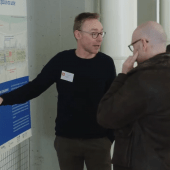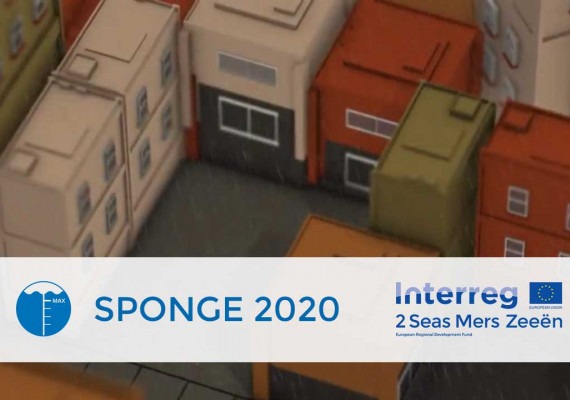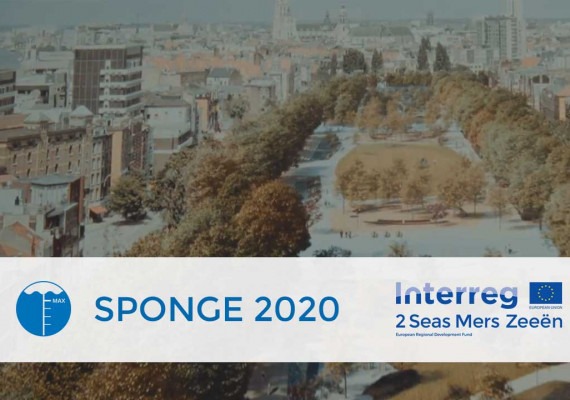SPONGE2020
Co-creation and implementation of innovative, participative climate adaptation solutions in densely built areas
Priority Axis
Adaptation to Climate ChangeSpecific objective
Adaptation to Climate Change
Lead partner
Regional Water authority of Schieland and KrimpenerwaardContact
Start Date
01/07/2016End Date
30/06/2021Project budget
6 840 256 €ERDF amount
4 104 154 €ERDF rate
60%About
Common challenge
Cities and densely built areas in the 2 Seas area must adapt to more frequent intense rainfall and increased risks of urban flooding. Traditional public investments in drainage and sewage infrastructure struggle to solve this challenge due to financial and spatial constraints.
This increases the risk of urban floods that can damage property, businesses and infrastructure, disturb economic activity and affect public safety. In the Netherlands alone, annual damages from extreme rains and hailstorms add up to €125 million. Due to climate change, this amount is estimated to increase from 40% to 135% by 2050 (Dutch Association of Insurers, 2015).
Local (water) authorities must resort to alternative, innovative solutions that integrate smart adaptation features in public and private spaces and buildings across their territory. And local stakeholders must become prominently involved in the implementation of those adaptation measures in/on their own properties.
The SPONGE partnership rose to the challenge realising that it required implementation of tailor-made adaptation features in both private and public places and buildings. They proposed co-creating and implementing innovative adaptation measures with local stakeholders in a range of different densely-built territories and sought to develop and test various tools and incentives to trigger adaptation measures by individual local actors.
Overall objective
Main outputs
Cross border approach
Main Achievements
After almost 5 years of cooperation, SPONGE2020 met all its objectives and delivered all its outputs successfully. The Co-creation toolbox as well as the Guidance Pack (Lessons Learned) were finalised and filled. The cross-border action plan ('Policy recommendations') was delivered in 2020. All 3 tools are available on the website at www.urbangreenbluegrids.com.
Due to Covid-19, the spin-off has not been what it could have been. However, the final newsletter has generated a great deal of viewers and partners could complete all 7 planned pilot solutions.
The participative, co-creational approach promoted by the project added essential tools to the planning and design of complex water adaptive projects. Co-creation has been a core concept and lessons for the project, only through actively engaging stakeholders did the project become a success. In fact, the more stakeholders were engaged the quicker and cheaper the pilots could be implemented.
Most of the pilots would at some point been realised by the individual partner organisations, although none of them were risk free. The discussions and ideas mobilised by the partnership helped to reduce the implementation risks of applying the new participative and co-creation approaches, and lead to significantly better implementation of these pilots. During the project, the pilots’ implementation was influenced by the lessons learned in the other pilots. The Rotterdam and Antwerp experiences with local stakeholder’s resistance brought strong lessons. When in the second phase their co-creation approach was improved, they had incorporated the UK approach of hiring independent consultants for facilitating the participative process. The turn-of-events in Rotterdam and Antwerp made it possible for Leiden municipality to fine-tune their approach and avoid similar setbacks.
The effect of doing an EU co-financed project with the joint effort of international experts had an empowering effect. A cross-border dedicated group of experts strengthens the quality of applied innovations and adds importance with the joint communication message. This brought change and strengthened work within the partnership organisations, on the pilot communities’ level, as well as on the political perception of climate adaptation and solutions. Site-visits as always appear to be strong ‘tools’ to emphasize this effect.
Testimonial

The 10 SPONGE partners are engaged to 7 pilot projects implementing water-based measures in their respective cities and learning from the process. Given the broad scope of the challenges, there is no easy solution. We need to turn to cocreation and work with our local stakeholders in our pilots by facing the same hurdles and exchanging knowledge. We aim to come up with better solutions and learn from one another.
Yill Vogelezang, SPONGE 2020 Lead Partner


